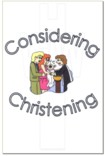Holy Communion Explained
The Lord Jesus, on the night before he died, took bread,
and when he had given thanks he broke it and said,
"This is my body which is for you; do this in remembrance of me."
In the same way, after supper, he took the cup, saying
"This cup is the new covenant in my blood; do this,
whenever you drink it, in remembrance of me."
1 Corinthians 11:23-25
From the earliest days, Christians have always celebrated Christ's death by eating together in obedience to what they see as Jesus' command contained in these words.
There has been much debate over quite what Jesus meant, and regrettably there is much confusion even amongst people who have been church-goers for many years. Holy Communion is often (quite rightly) seen as a serious matter and, largely because of this, has been the privilege of adults for centuries. However, over the last 30 years, theological arguments have been put forward which suggest children should be included. The following information is intended to provide a basic guide to the way Holy Communion (also called The Eucharist or The Lord's Supper) is understood and practised in our benefice.
The Night Before he Died
Jesus spoke these words on the night before he died whilst he was having a meal with his disciples. The meal was the Passover Meal traditionally celebrated at that time of year by all Jews as a celebration of God's great work of salvation for his people in bringing them out of slavery in Egypt. This story can be found in the book of Exodus, and the meal is first detailed in Exodus chapter 12.
After a long diplomatic exchange between Pharaoh (King of Egypt) and Moses (God's representative), it became apparent that Pharaoh's heart was so proud he believed he could defy the living God. He continued to make life a living hell for the Israelites, refusing to let them leave the land even temporarily to worship God. So, reluctantly (for God does not desire that any should perish) but acting in keeping with his covenant promises, God then rescued his people from Pharaoh's tyranny by demonstrating once and for all that he truly was God (he and no other); he sent a destroying angel to kill the first-born of all the families of those who followed the false gods of Egypt - the very same treatment they had meted out upon the Israelite slaves.
In order to save themselves from the destroying angel, the Israelites were to slaughter a lamb (a perfect beast, without blemish) and to smear the blood on the lintels and doorposts of their houses. When God then executed his terrible judgment upon the proud and arrogant Egyptian people, he promised to spare all the first-born dwelling in houses with blood on the lintels and doorposts. Thus, the lamb would effectively become a substitute for the first-born of the house; the lamb would die in their place. The Israelites expressed their trust in God by obedience to his command, and their exercise of trust was rewarded with life and freedom - Pharaoh, finally realising he was no match for God, let his Israelite slaves go free. God then instructed his people to commemorate this great rescue annually by eating a special and symbolic meal based around lamb. This became known as the Passover Meal, in remembrance that God's judgment "Passed Over" those who trusted him.
It is significant that Jesus celebrated this meal immediately before his death, because in his death he became a substitute for sinners who would otherwise face the fury of God for their rebellion against him. John's Gospel and the book of Revelation refer to Jesus as the "Lamb", picking up this idea of substitutionary death. Alluding to the writings of the prophet Isaiah, the Apostle Peter writes that Jesus bore our sins in his body on the tree (1 Peter 3:24), i.e. he died so that we don't have to.
There are important parallels between the Exodus story and the gospel, and therefore our celebration of the meal we call Holy Communion is intimately related to its Jewish precursor; where the Passover meal was a celebration of the salvation of a nation from physical slavery, so Holy Communion is a celebration of the salvation of Christ's people from slavery to sin. Where the death of the lamb provided the escape for the Israelite slave, so the death of Jesus provides life for the sinner.
Bread and Wine
An important part of the Passover Meal was bread and wine. At his "Last Supper" Jesus took a loaf of bread, broke it and gave it to his disciples. He also shared out a cup of wine. As he shared these things out, he told his disciples to associate them with his body and his blood in striking metaphorical language; "This is my body... This is my blood."
In the communion service, before the priest offers it to the gathered congregation to share, he takes bread and wine in much the same way as Jesus did. Some people refer to this as the "blessing" of the bread and wine, but this is slightly misleading. When Jesus took the bread and wine he did not "bless" them; rather, he thanked God for them. The meal is a meal of thanksgiving, and it is good and right that we should thank God for his gracious provision of food. However, in thanking God for the bread and wine, Jesus was also thanking him for the rescue that the meal had come to represent for the Israelite people - namely the rescue from slavery in Egypt. So too, when the Christian minister thanks God for the bread and wine, he is primarily thanking God for the rescue that the bread and wine symbolise - namely the rescue from slavery to sin and its horrendous consequences.
As we participate in the Holy Communion service, and despite the teaching of some factions within the worldwide church, we must recognise that the bread and wine do not themselves change in any way as a result of the priest's prayer. However, the prayer does intend that those who eat and drink of the bread and wine set apart by the priest will, as they eat, be spiritually nourished by Jesus; the church family are exhorted to eat and drink the bread and wine, and simultaneously to feed on Jesus by faith, in their hearts, with thanksgiving.
It is good to recognise that just as bread is a basic food, so Jesus satisfies all our needs. It is also worth remembering that in biblical times wine was often seen as a generous gift - water would be a more usual accompaniment to a meal; so too God is generous to us, and, in Jesus, gives us more than we could ever deserve or expect.
Remembering
Sadly, just as the church has been divided over what "happens" to the bread and wine, so the church has also struggled to agree on what "happens" to those who partake of the meal. There are two errors into which we must not fall.
Firstly, there is superstitious eating. This is where people place too much importance on the moment of eating, the elements of bread and wine or in the "service" itself. If the bread and wine are seen to have become special through the prayer of the priest, it is thought that the simple act of eating this special food will somehow make the person clean, acceptable to God, holy etc. It has been argued that this approach appropriately stresses the grace of God reaching out to helpless humanity - God offers his riches in the bread and wine, and all that we need do is eat trusting in his goodness.
Whilst we would agree with the statement that the meal is an expression of the grace of God, we suggest this approach risks diminishing the requirement upon us to live all the time in a godly manner. If this superstitious approach were correct, it would be possible for Christians to live a deliberately sinful life six days a week, then put everything to rights by eating the "special" bread and wine. This is clearly not the case. In fact, we are called not to blind and ignorant faith, but to confident trust and the conscious and active renewal of our minds (Romans 12:2). We are commanded to be holy, as God is holy (1 Peter 1:15). We must regularly submit ourselves to the instruction and correction of God's word to us not just treat the communion service as a sort of "fix" of holiness.
The opposite error is a mindless remembering, where the communicant fails to make the intellectual, emotional and spiritual connections discussed above, and therefore does not experience the nourishing of Jesus. When we "remember" we are to call to mind what Jesus did for us by dying in our place, and to re-commit ourselves to following him.
The Apostle Paul writes "Very rarely will anyone die for a righteous man, though for a good man someone might possibly dare to die. But God demonstrates his own love for us in this: while we were still sinners, Christ died for us" (Romans 5:7-8). As we eat the bread and ponder his gift of himself to us, so we should be stirred to weep over our sins which took him to the cross, to rejoice in our union with him which brings us the possibility of new life with God, and in every waking moment to honour his name more fervently than before. With so much to consider and so great a love to receive, it is appropriate, then, for people to take time eating the bread and drinking the wine without being rushed.
A Serious Matter
The Holy Communion service is a serious matter. In it, we remember with great thankfulness God's amazing love for us; we recognise in the bread and wine that Jesus had to die to win forgiveness for us. Therefore the communion table is a place of great weeping as we acknowledge our own sin and guilt which took Christ to his cross, and yet it is also a place of great joy; for by faith we are assured of our forgiveness and our status as children of God.
But Holy Communion is not entirely about our relationship with God as individuals. Occasionally people talk about "making my communion" as if they and God are together for the event whilst being completely isolated from anybody else. This is an inappropriate way to talk about what is essentially a family meal. In fact, the Bible clearly teaches that the relationships we have with other Christians are very important, so to treat the family meal as a private individual event is at best selfish.
Much of the subject matter of the Apostle Paul's first letter to the Corinthians (Christians living in Corinth) is about the way the people in the church family were mistreating one another by being selfish and proud. Chapter 11 deals with the occasions when they came together as a church family to eat this family meal (they ate a full meal together then). Paul accuses some of them of being greedy, leaving others to go hungry, and says that there is no place for such selfishness in the life of a Christian. He goes on to warn them that selfishness like this is especially dangerous when celebrating the family meal. He even goes so far as to say that some people had become ill as a result of being selfish like this, and some had even died (1 Cor 11:30). The implication is that God is displeased when people mistreat one another, especially when they are supposed to be sharing with one another in complete unity and harmony.
As a result of this the church encourages practices which promote unity amongst the family and a determined devotion to our Saviour Jesus. At the same time, out of concern for the spiritual well-being of all people, by setting limits to the accessibility of the family meal, the church is careful not to allow anyone to trespass (unwittingly or deliberately) into the dangerous territory of God's displeasure.
In practice, this means that the only people welcomed to share in the family meal are baptised Christians. Others may participate in the rest of the meeting, but they may not receive the bread and wine. Our desire is that ALL should enjoy the meal with us, but since the Bible makes it clear that we should approach the meal confident in Christ's forgiveness, we protect people who are ashamed to own the name Christian by not allowing them to participate. Indeed, even baptised Christians fall into sin, and the church's practice is to refuse them admission to the family meal until such time as they repent of (turn their back on) their sins and make a determined effort to live a Christ-like life again. This practice is called "excommunication" - an attempt to discipline the unruly out of love for them and for others.
Children
Until recently, the laws of the Church of England stipulated that a person must be confirmed before they were allowed access to the Lord's Supper. In practice this prevented most children from joining in with the family meal, for most children were not confirmed until at least their 10th birthday. Now, the Church has re-considered the meaning of baptism and is prepared to admit baptised children to receive bread and wine before their confirmation under certain circumstances.
Currently, this benefice has not yet fully considered the theological arguments for and against the admission of children to the Lord's Table, so the majority of children from the benefice do not receive communion. However, in keeping with national guidelines, any children who have been admitted to receive communion in other churches are entitled and very welcome to do so here. Click here for further information about this whole issue, including up to date reports of the PCC deliberations.
New Covenant
A covenant is a binding agreement between two (or more) parties which defines responsibilities the parties have toward one another, and therefore dictates the shape of the relationship. One useful parallel is the marriage relationship between husband and wife.
In the bible, we read how God initiates a number of special relationships with individuals or groups of people, making promises to them and demands of them. These relationships are described in terms of God's covenant. The story of the Israelites from Abraham onwards which we read in the collection of books known to us as The Old Testament describes the working out of that covenant. The Old Testament is so called because the Greek word for covenant is Testament.
The covenant agreement between God and the Israelite community finds its fullest expression in the laws of Moses (beginning with the Ten Commandments). When Moses had announced the terms of the covenant to the Israelites, and after they had declared their assent, he sacrificed some bulls, pouring half the blood on the altar and sprinkling the rest upon the people as a sign that they were bound to God in this covenant. He proclaimed to them, "This is the blood of the covenant that the LORD has made with you." (Exodus 24:8).
Many years later, though still living in the time of this covenant between God and the Israelite people, the prophets were very conscious that whilst God was blameless in keeping his side of the bargain, the Israelites constantly failed to honour their obligations. They recognised that whilst there were lots of activities stipulated under the covenant, keeping the covenant was actually a matter of the heart; God was ultimately less interested in the sacrifices themselves than in the integrity of the heart which offered the sacrifice. They began to write of their conviction, never calling the Israelites to stop obeying the literal word of the covenant, but strongly urging them to ensure first of all that their hearts were sincere in their relationship with the LORD. Jeremiah spoke of a New Covenant which would be written on their hearts instead of on tablets of stone. Ezekiel spoke of the Spirit of God breathing life into the dried up bones of his people. And their words were fulfilled in the coming of Jesus.
When Jesus passed round the cup of wine after the supper, he spoke words which strongly echoed the words of Moses, only this time he spoke of the New Covenant in his blood. The time for the sacrifice of bulls, or indeed any other animal, was passed. Where the Old Covenant had been ratified by the blood of a sacrificial animal, this New Covenant was going to be established and ratified by the shedding of Jesus' own blood. Jesus' death sealed a new formal agreement between God and humankind - he offers eternal love and forgiveness, all we need do is trust and accept it. Have you done this? Look here for more information or contact the Rector.






